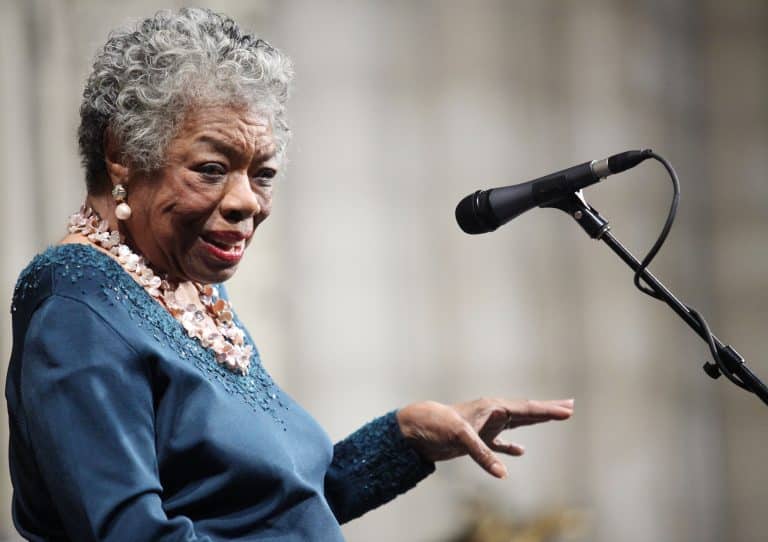
Writer Maya Angelou attends the memorial celebration for Odetta at Riverside Church on February 24, 2009 in New York City. Image by Astrid Stawiarz/Getty Images, © All Rights Reserved.
What Maya Angelou Taught Me About Paying It Forward
In my last few columns, I have been reminiscing about my first few days at university. One of those memories has to do with my one and only in-person encounter with the incomparable revolutionary and inspiring poet, Maya Angelou.
I only remember three things about my college orientation service: the magnificent Gothic chapel; the impact of having a teacher, a mentor, who saw us; and third — I will always remember that Maya Angelou spoke. She came almost every year to address the incoming class. She moved us, inspired us, and loved on us.
Already in those years, she was more advanced in age than the people who usually spoke to my age group. But there was something about her: a wisdom, a confidence, a sassiness, a lived experience — long before I had heard of the word “swagger.” I was mesmerized and could not take my eyes off of her. What did she have to say? And how would she say it?
She didn’t just walk on the stage. She strutted. She prowled. She moved like a tiger teasing her prey. She owned the crowd. She played with the crowd. She was so comfortable in front of this group of uncertain 17- and 18-year-olds. She loomed larger than most of the audience, including the collection of funnily-dressed professors, mostly white men, almost all in these ridiculous costumes (academic robes).
In the middle of her speech, she pointed in her inimitable, dramatic way to the crowd and thundered:
“You have been paid for.”
We were thousands crammed into the chapel, but somehow I felt like she was looking at me. It was as if her loving, wise glance reached right to me and went through me.
“You have been paid for.”
She saw me. She saw my family. She saw our sacrifice. She saw our struggle. She saw our humanity.
I had been paid for. I didn’t know fully what that meant. That language, though, resonated deeply with me.
Years later, after studying Buddhism and Judaism and Christianity and Islam, I came to recognize her language as deeply Christian, one that in theological circles had to do with Jesus having paid for our sins. But as s 17-year-old Muslim kid, I knew nothing of these theological debates. No, Maya’s statement resonated differently with me.
Paying and being paid for was a huge area of concern for me and my immigrant family, especially with me choosing to attend such an expensive private school.
At the time the cost of my school was around $40,000 a year. It seemed insanely expensive to me then, and it still does. There were six of us, and that was more than my family’s whole income at that time. By the time my children attend the same university (or a similar one), it will cost close to $70,000 a year. It is, truly, insane. Educational loans are one of the largest sources of debt in America. This is another way that we, in America, stand alone, but not in a way that one would be proud of.
In so many other countries, universities are free or practically free. So many of our students, particularly in private schools, emerge with the equivalent of a mortgage that effectively hemorrhages their future before they have even started their adulthood. To treat universities as a for-profit business is the height of madness and an inversion of priorities.
But, here was this magnificent, charismatic, beautiful, wise black woman telling me that I was paid for. Sitting there with all the insecurity of not knowing how to pay for college, how my parents were going to pay for my college, feeling guilty that my family was spending our finite resources on college, feeling that I didn’t belong (no, knowing that I didn’t belong), and having some of my classmates tell me that I didn’t belong (“You are only here because you are a diversity applicant,” I was told in my first week of college by a kid down my hall), knowing that I was paid for was reassuring. I felt less alone knowing that my parents’ sacrifice kept me company.
I was there with my family’s love, with their sacrifice, and I was not alone. I was paid for. I was paid for not just in money (though I still carry the student loans almost three decades later); I was paid for in love, I was paid for in tears, and I was paid for in sacrifice. And somebody knew that. Somebody saw us, somebody recognized us. I belonged, just a little bit more.
Over the years, I followed Maya Angelou. I learned about her life in the ’60s, her writings, and her fierce and proud ways. I learned about I Know Why the Caged Bird Sings and “Still I Rise.” But always, even today, it is this notion of having been paid for that resonates with me.
I have been paid for, not through the blood of Jesus but through the blood, sweat, and tears of my parents. I was paid for. I was paid for, not in heaven but right here on Earth. My own education, my life, was paid for.
No, I could never, and I cannot now, pay my parents back. But I can pay it forward.
So now, as I look upon my own children, and my own (insha’Allah) as-of-yet unborn grandchildren, I want them to know that they are paid for.
And so it goes, friends. We are paid for and must pay it forward.
There is a circle of life. And there are circles of love. Circles of sacrifice. No beginning, no end.
We are here because somebody loved us.
We are here becomes somebody sacrificed for us.
We are here because somebody paid for us.
Pay it forward.


Share your reflection